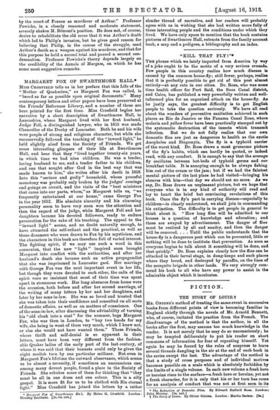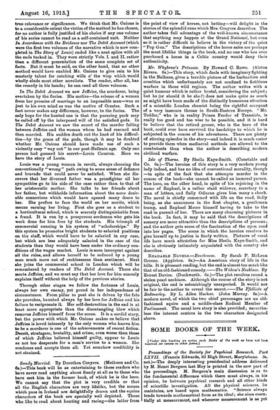FICTION.
THE STORY OF LOUIE.t
ONIONS'S method of treating the same event in successive books from different points of view is becoming familiar in England chiefly through the novels of Mr. Arnold Bennett, who, of course, imitated the practice from the French. The disadvantage of the method is that the author, in all the books after the first, may assume too much knowledge in the reader. It is not merely that he may do so unconsciously; he may be tempted deliberately to put his reader on short commons of information for fear of repeating himself. Yet again he may be forced by the rules of suspense to leave several threads dangling in the air at the end of each book in the series except the last. The advantage of the method is that a study of cross purposes and of individual motives becomes possible on a scale which is absolutely forbidden by the limits of a single volume. In each new volume a fresh hero or heroine rises to the surface—a fresh hero or heroine, yet not a fresh character, for it is only that his or her turn has come for an analysis of conduct that was not at first seen in its • The Reduction of Domestic Flies. By Edward Belford Ross. London, John Murray. [Is. net.] I- The Story of Louie. By Oliver Onions, London : Martin Seeker. [Se.] true relevance or significance. We think that Mr. Onions is to a considerable extent the victim of the method he has chosen, for no author is fully justified of his choice if any one volume of his series cannot be read as a self-contained unit. Neither In Accordance with the Evidence nor The Debit Account (which were the first two volumes of the narrative which is now com- pleted in The Story of Louie) ended like a neat splice with all the ends tucked in. They were strictly Vols. I. and II. rather than a different presentation of the same complete set of facts. But it must be said, on the other hand, that no other method would have enabled Mr. Onions to give rein to his masterly talent for catching wills o' the wisp which would wholly elude most other novelists. The reader, after all, has the remedy in his hands ; he can read all three volumes.
In The Debit Account we saw Jeffries, the murderer, being overtaken by the furies. His motive—the release of a woman from her promise of marriage to an impossible man—was as just to his own mind as was the motive of Orestes. Such a fact never makes any difference, however, to the furies. The only hope for the hunted one is that the pursuing pack may be called off by the interposed will of the satisfied gods. In The Debit Account we saw the secret of the murder falling between Jeffries and the woman whom be had rescued and then married. His sudden death cut the knot of his difficul- ties—by the grace of the gods, though it may be doubted whether Mr. Onions should have made use of such a violently easy "way out" in our post-Hellenic age. Only one person had guessed his secret—Louie Causton. Here we have the story of Louie.
Louie was a young woman in revolt, always choosing the conventionally "wrong" path owing to some sense of defiance and bravado that could never be satisfied. When she dis- covers that her divorced father was a prizefighter all her sympathies go to his side of the case rather than to that of her aristocratic mother. She talks to her friends about her father, but withholds information about the more desir- able connexions which would have opened many doors to her. She prefers to face the world on her merits, which means earning her living. First she goes as a student to a horticultural school, which is scarcely distinguishable from a fraud. It is ran by a prosperous seedsman who gets his work done for him free by the students. His triumph of commercial cunning is his system of "scholarships." By this system he promotes bright students to salaried positions on the staff, which would have to be salaried in any case, but which are less adequately salaried in the case of the students than they would have been under the ordinary con- ditions of the wages market. Louie is soon insurgent against all the rules, and allows herself to be seduced by a young man much more out of recklessness than sentiment. Next she joins the commercial school in London which will be remembered by readers of The Debit Account. There she meets Jeffries, and we must say that her love for him scarcely explains itself without the help of the previous stories.
Through other stages we follow the fortunes of Louie, always her own enemy, yet proud in her independence of circumstance. From pillar to post she is driven by the fate she provokes, haunted always by her love for Jeffries and his failure to reciprocate it. Her self-destruction in the end is at least more appropriate than the disentangling blow which removes Jeffries himself from the scene. It is a sordid story, but the power with which Mr. Onions makes us believe that Jeffries is loved intensely by the only woman who knows him to be a murderer is one of the achievements of recent fiction. Deceit, stratagem, brutality, and crime, even worse than those of which Jeffries believed himself guilty, appear to Louie as not too desperate for a man's service to a woman. She condones and accepts them all. Yet somehow credibility is not strained.



































 Previous page
Previous page